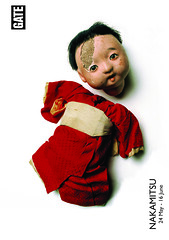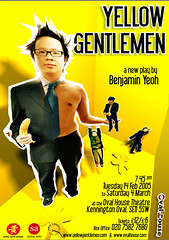Theatre Boards
Following on from my comment on Jane Edwardes’ interviews with artistic directors, she mentions in her impression of the new Gate Artistic Directors.
“an apparent desperation not to upset the theatre’s board by saying the wrong thing”
This highlights a subtle but important aspect of running theatres and charities, its board.
I think Edwardes was potentially being unnecessarily hard in judging attempts “not to upset a board” as “apparent desperation”.
Generally, a board and its executives should meet in harmony and synergy with creative tension and direction where necessary.
Problems at board level, or a split between its board and executive would be a disaster for a company. A weak board is equally a potential disaster.
Nick Hytner at the NT has said this about NT’s board
Does the Board ever get involved with repertoire?
The Board never gets involved. It would be hard to point to a precise date when the Board stopped getting involved with repertoire choices, but it doesn’t any more. I report to the Board what the repertoire will be, on a meeting-by-meeting basis. They always have a clear idea of what the artistic direction of the theatre will be, moving forward. If I suddenly decided there was going to be a radical shift in the direction the National Theatre was going to take – if for instance I decided the National would do no more new plays, or no more classics – then they would intervene, and they would be right to intervene. But they don’t consider it to be their job to intervene in the day-to-day running of the National and that would include the choice of repertoire. But they do very much consider it their job to be overall custodians of what the National Theatre is.
For the record the current board is: Chairman, Sir Hayden Phillips GCB; Members, Anjali Arya, Susan Chinn, Nicola Horlick, Rachel Lomax, Neil MacGregor, Caragh Merrick, Grahame Morris, Caro Newling, André Ptaszynski, Philip Pullman, Rt Hon Lord Smith of Finsbury, Edward Walker-Arnott & Nicholas Wright.
That’s a very powerful board in reach, reputation and clout.
The Gate’s board (Kevin Cahill, Jonathan Hull, Pim Baxter, Mark Bayley, Diane Borger, Rupert Christiansen, Susan Hitch, Rima Horton and Colin Simon) may not on the face of it seem quite as scary but they are the custodians of the Gate Theatre and its only right to have respect and not to upset them. Challenge them, yes. (Although as ADS they will employ you)
Boards must be proper custodians too. Some speak of recent issues at the Bristol Old Vic of the board maybe not being brave enough. I don’t know the circumstances but theatre boards are a vital part of actually getting a theatre building/company to work.
[Note, I speak with a bias being on the Talawa Theatre board.]
Artistic Directors
Jane Edwardes (and Rachel Halliburton) from Time Out have done some interviews with recently appointed Artistic Directors. She forms a critical first impression of Natalie Abrahami and Carrie Cracknell, who are the Artistic Directors at the Gate.
She writes “I have to admit that when I came back from interviewing Natalie Abrahami and Carrie Cracknell, the young artistic directors at the Gate, the theatre above a pub in Notting Hill, my feeling was that if they were the future of British theatre, I didn’t want to know. There was far too much talk of ‘going on journeys’ and their references to ‘brave and bold decisions’ was in sharp contrast with an apparent desperation not to upset the theatre’s board by saying the wrong thing. It seemed a far cry from the charisma and drive of their predecessors, who include Stephen Daldry, Mick Gordon and Thea Sharrock. But to be fair, when your programme is still being finalised and can’t yet be talked about, it’s difficult to deal in anything but abstractions…”
Everyone is entitled to opinions and first impressions make valid copy.
However, I would like to say, having worked with both of them at the Gate and Natalie previously that I think they will be brilliant there. Both strike me as thoughtful directors and I expect them to put on interesting and brilliant work.
Perhaps, as new ADs running a building for the first time they will have steep learning curves but I have no doubt they will fill the shoes of their illustrious predecessors.
Edwardes ends her article on a more upbeat note:
“A week later with crucial contracts signed, Abrahami rings to tell me that Cracknell will be directing the first production, ‘The Sexual Neurosis of our Parents’, by Swiss playwright Lukas Bärfuss. She is then following it up with Fernando Arrabal’s ‘Car Cemetery’, which she describes as an ‘irreverent, exuberant absurdist play’, a celebration of the playwright’s seventy-fifth birthday. Given that Bärfuss has never been seen in this country before and that the Spanish playwright, Arrabal, has never been particularly popular, they are indeed ‘brave and bold decisions’ – and, of course, just what the Gate should be doing.”
They also interview Josie Rourke (Bush, with the wrong photo image at the time of writing), Dominic Cooke (Royal Court), Lisa Goldman (Soho, again wrong photo), Paul Robinson & Tim Roseman (Theatre 503).
They gave a flavour of what each director may be looking for but I’m not sure they represent them that accurately in my opinion. Maybe.
Andrew Haydon also has an interesting take on it suggesting interviews are hard when there’s no track record.
Thoughtful graduation speeches
Dana Gioia (head of the National Endowment for Arts in the US, think super-powered UK Arts Council) gave a speech to Stanford Graduates – here:
Saying:
“…The loss of recognition for artists, thinkers, and scientists has impoverished our culture in innumerable ways, but let me mention one. When virtually all of a culture’s celebrated figures are in sports or entertainment, how few possible role models we offer the young.
There are so many other ways to lead a successful and meaningful life that are not denominated by money or fame. Adult life begins in a child’s imagination, and we’ve relinquished that imagination to the marketplace…”
And
“…Marcus Aurelius believed that the course of wisdom consisted of learning to trade easy pleasures for more complex and challenging ones. I worry about a culture that bit by bit trades off the challenging pleasures of art for the easy comforts of entertainment. And that is exactly what is happening—not just in the media, but in our schools and civic life.”
And
“…How do we explain to the larger society the benefits of this civic investment when they have been convinced that the purpose of arts education is mostly to produce more artists—hardly a compelling argument to either the average taxpayer or financially strapped school board?
We need to create a new national consensus. The purpose of arts education is not to produce more artists, though that is a byproduct. The real purpose of arts education is to create complete human beings capable of leading successful and productive lives in a free society. ”
And closer to home, many congratulations to Dr. David Eldridge who echoes some of the same thoughts in his speech along with
“A favourite memory of my time here at Exeter was with Peter when our year group wrote a Brechtian version of The Wind in the Willows.
We ventured on to Exmoor to experience a real Wild Wood and to find some badger sets and then afterwards the group spent a magical hour or two reading Brecht’s poems to each other in the embrace of a generous pub fire.
Of course, we began to form some of the essential bonds required to make a show and began to taste something of the famous German playwright’s rich flavours and to create a rooted reality for our play.
But years later it occurred to me that actually he mostly did it because it would be fun. He knew that we might remember moments like this as they lodge fast in the heart and are amongst a life’s greatest riches.
Although Peter might baulk at the comparison in a way Hector the hero of Alan Bennett’s thoughtful hit comedy The History Boys seems like a bed-fellow.
Even with the bike and the motorcycle leathers Hector seems a bit old-fashioned even in the play’s context of the eighties – quoting Houseman and espousing the notion that all knowledge is precious. But let me say this IS a precious idea that IS worth standing up for today and tomorrow.“
When to run, Sophie Woolley
I’ve met Sophie, so I don’t think this review, if you can call it that, can be unbiased. Suffice to say, I enjoyed her show WHEN TO RUN greatly.
It’s going to be on again 15 August at the Regents Park Open Air Theatre, which I think will be a brilliant venue for it. It’s then at a few more venues which you can check here.
Her show is a mix of comedy and character performance, which falls between stand up comedy and the monologue.
She interweaves character (or even caricature) monologue stories and touches upon the emotional heart of why her characters run. They are all women. And they are all missing something or someone. This missing part also interweaves.
Running to look good. Running to compete. Running to make up for a lost part of your life.
However, perhaps my enjoyment mainly stems from: the straight up jokes, the commitment to performance and the comedy characters which although larger than life somehow still seem a bit true.
If you like comedy with a story, you’ll like Sophie’s show. Also it’s less than an hour.
Sophie is also very good about making her work available on a captioned basis, so if you’re hard of hearing this show would also suit (although not the Regents Park performance).
Screenwriting
Article on screen writing by Ronald Harwood
“…an important lesson when adapting for the screen: always to be true to the source material, the original author’s truth.
… Certainly, I have learned that the screenwriter’s relationship with the director is at the very heart of film-making, but the cult of the film director is now so pervasive that the screenwriter is mostly consigned to oblivion. If a critic admires the film the screenplay is ignored; if he finds fault, the screenplay comes in for a mauling. Thus, the screenwriter must learn that he is not an equal partner; indeed he is somewhat subservient. …
But most important of all, the writer must be sure of the world about which he’s writing and has to approach the screenplay with the same degree of commitment as he or she would any other work. I have also come to understand that form is of secondary importance to content. What a film is about stands above all else. Moreover, the screenplay, besides supplying all the information that it needs to supply, must be enjoyable to read. My advice is: just tell the story – which is not as easy as it sounds. And, finally, the director should shoot the film laid down in that document and no other. I talk, of course, of an ideal world.”
He makes an interesting point about the cult of the director in film making (and the subservient role of the writer), which is not as strong in theatre making, although we have our fair share of brilliant auteurs.

